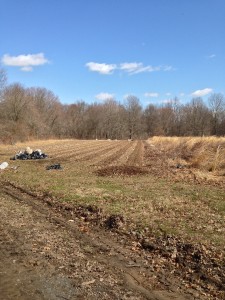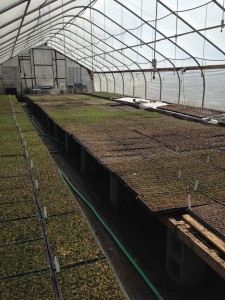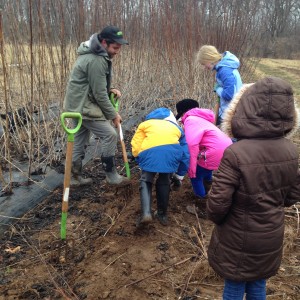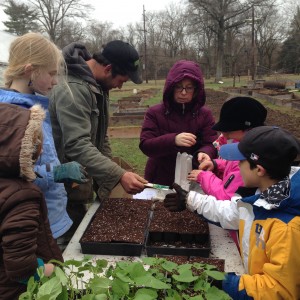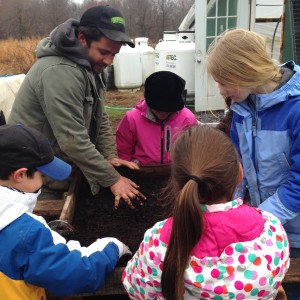Farms
Eating Local in New York City
As fruits and vegetables have become increasingly globalized products, New Yorkers are reassessing their relationship with food. Now, more than ever, people are rejecting the dominant food system in favor of alternative local options. The idea that the average grocery store item travels more than 1,500 miles before reaching a diner’s plate has inspired a desire for better access to foods grown closer to home. Concern about agribusinesses has sparked tremendous interest in farmers’ markets, community-supported agriculture (CSA), and farm-to-school programs.
In an attempt to reclaim control over what they eat, city dwellers are practicing neolocalism, whereby they foster local connections, identities, and economies through their consumption practices. Instead of turning to supermarkets, individuals are purchasing their fruits and vegetables from regional farms, such as Z Food Farm in Lawrenceville, New Jersey. Farmer David Zaback’s goal is not only to produce high-quality organic food, but also to promote food as a powerful cultural force for interacting with the environment and within communities. Sustainable farming practices, like those practiced at Z Food Farm, allows for the formation of local connections, direct ties between urbanites and the farmers and landscapes that sustain them.
Organic Farm Practices
Z Food Farm, Lawrenceville, NJ.
The desire to reconnect with food is reflected not only in what consumers purchase, but also in the practices of farmers. As requests for environmentally sustainable and high-quality products have increased, many farmers have adopted organic practices. The United States Department of Agriculture (USDA) defines organic agriculture as the process of generating produce through methods “that preserve the environment and avoid most synthetic materials, such as pesticides and antibiotics.” Certification verifies that irradiation, sewage sludge, synthetic fertilizers, prohibited pesticides, and genetically modified organisms are not used to grow crops.
Organic farmers share a common goal, to produce healthy and tasty harvests. To accomplish this, farmers subscribe to a form of agriculture that relies on use of crop rotation, nonsynthetic fertilizers, and compost. As a certified organic facility, Z Food Farm employs a number of these sustainable methods. For example, Zaback uses a naturally produced compost and fertilizer for his plants. His system recycles waste from mushrooms, which he combines with other animal-based organic products.
Alternative Farm Methods
Z Food Farm Location in Lawrenceville, NJ, map courtesy of Google Inc, used under license.
One increasingly popular alternative to the dominant food system is community-supported agriculture (CSA), whereby farmers solicit members, who pay an annual membership fee and receive a share of the harvest throughout the growing season. This alternative type of farming attempts to transform the food system into one that is socially just, locally based, and environmentally sustainable.
Z Food Farm functions as a certified organic farm with a CSA component. Zaback offers two different types of membership. As accessibility to good fruits and vegetables has become a key part of the food justice movement, farms like Z Food Farm are incorporating nontraditional methods to make food as available as possible. The farm-share membership works as a traditional CSA shareholder system. The secondary type or market-share membership is for non-traditional consumers who can support the farm by purchasing credit before the season begins. There are no assigned pickup days, so people can shop like a regular customer at his farm or farmers’ market stall. This option allows customers to participate if they cannot commit to a weekly pickup. Additionally, during the 2014 season Zaback sold his fresh produce at weekly farmers’ markets, including the Andaz Wall Street Market in NYC and the Rittenhouse Square market in Philadelphia.
The goals of CSAs go beyond economic exchange. Increasingly, they have become a power tool used to promote a geographic idea that encourages the formation of local connections and direct ties between the consumer, the farmer, and the environment. Models like the ones used by Zaback create community ties to food that are absent in supermarkets.
Food Citizenship
Community at Z Food Farm, Lawrenceville, NJ.
To strengthen New York’s relationship with food, farms are taking on a new social role. Agricultural models like CSAs have begun to engage with food production and consumption by creating a more democratic, sustainable, and economically just food system. Also known as food citizenship, this practice is designed to instill a sense of belonging that motivates individuals to become active participants rather than passive consumers.
Young children are a crucial demographic for this type of community engagement. It is important that children are taught the complexities of the food system and develop the passion to take responsibility for their food and community. Once a month, Zaback works with a group of young students in grades three through five from the Princeton Friends School. The students spend an hour working one-on-one with him planting and harvesting vegetables. Programs like this teach students that food is more than what you eat. In exchange for their assistance, he teaches the children about sustainable farming practices in the hope that they will develop a greater connection to their food. -D.Z.

